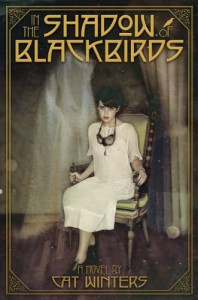books and cleverness
I read books of all sorts, but mostly kids' lit and young adult literature and speculative fiction for all ages—usually from a feminist perspective.
I've adopted a personalized version of the CHOICE reviews approach to recommendations/star ratings:
***** = Essential, a.k.a. truly love, absolute must-read, buy it now
**** = Highly Recommended, a.k.a. this is a really good book; I would buy it as a gift
*** = Recommended, a.k.a. pretty good; worth reading
** = Optional, a.k.a. meh
* = Not Recommended; a.k.a. this is not a good book
In the Shadow of Blackbirds

Overall Recommendation: Optional. This book’s strengths lie in its fictionalization of historical detail, rather than its plot.
I also recommend reading this with the awareness that it is a ghost story. I did not; I kept expecting it to turn out to be simply a psychic-connection story, and therefore I suspect I missed out on some of the potential enjoyment of spookiness.
What is there to like?
▪ The historical subject matter—the confluence of World War I, the flu pandemic of 1918, and the revival of Spiritualism and spirit photography—should spark readers’ interest and prompt a desire to learn more about what really happened, which is one of the strengths of reading historical fiction. Cat Winters has incorporated some interesting components from real-life events, like folk remedies and preventive measures that were common during the epidemic, and a character whose methods suggest that he is based on Harry Price, a psychic researcher who made a business of exposing spiritualist frauds. Credit to the author here: I began looking these things up as a result of reading this.
▪ A female protagonist, Mary Shelley Black, interested in science and technology, independent, and determined to find out the truth.
▪ The book’s design, including chapter headings and decorational art. The inclusion of historical photos and visual materials to lend weight and a sense of realism and immediacy to the historical context, is an especially good choice. Here’s one that is used, for example, of the Red Cross response during the flu epidemic.

▪ A major theme is the destruction of war, and the price paid for it in the lives of a nation’s youth. The narrator has a number of occasions to reflect on this—her father is arrested for his pacifist beliefs, she loses the boy she loves when he joins the army, and she encounters wounded soldiers when she volunteers at a Red Cross station.
What’s not to like?
▪ The love interest, Stephen Embers, is more of a symbol of the young man destroyed by the circumstances of the war than a fully dimensional character—he is already gone at the point the novel begins. As such, it is difficult to become invested in Mary Shelley’s feelings for him, and the sense of urgency she has in discovering what happens to him (plot problem #1).
▪ The thing about mysteries is, you already know the crime that has been committed, so the driving force is finding out who did it. In this case, we always already know who did it, and we always already know the end result. So, Mary Shelley’s investigations are only into the circumstances surrounding what we already know to have happened. This is the other reason why the plot is less than compelling.
There were also a few points about the book that I found off-putting:
▪ There is a weird ghost dry-humping scene. Not sex, because he’s a ghost and that means he can’t take off his ghosty clothes because that’s how ghosts work? But then how he is corporeal enough to make out and have an erection? I don’t know, it doesn’t make a whole lot of sense.
▪ The aunt is under 30 and has a fascination with a character who is a few years her junior, but she’s drawn as if she’s some out-of-touch middle-aged woman chasing after a much-younger man.
▪ The protagonist repeatedly excuses unsolicited attention and flirting from soldiers as, basically, the least she can do for our brave men in uniform.
What made me pick it up?
Picked it from my to-read list, thinking spooky and historical sounded good.
Similar To:
All Men of Genius, Lev A. C. Rosen—for another forward-thinking, technically-minded heroine with a mystery to solve
The Fairy Ring: Or Elsie and Frances Fool the World, Mary Losure—this is one that I’m actually looking forward to reading myself, and the two girls and their photographs are specifically mentioned in this book. Pretty cool!
Rilla of Ingleside, L.M. Montgomery—for a WWI novel written by a contemporary (pretty sad stuff, and romantic too, of course)
The Diviners, Libba Bray—for some supernatural teenagers stuff, post-WWI




